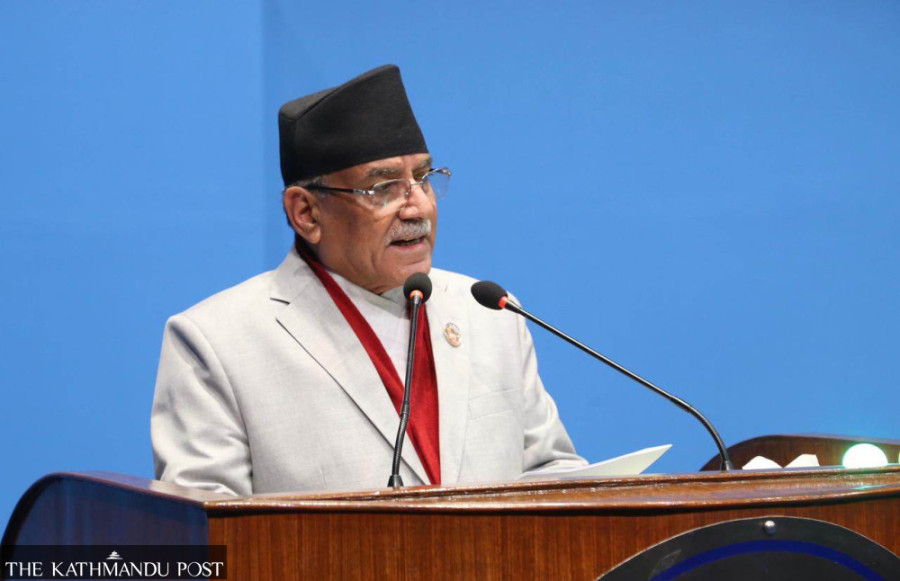Politics
Dahal assured comfortable majority in his second vote of confidence
Leaders are trying to convince minister aspirants their time will come in other PM terms.
Tika R Pradhan
When Pushpa Kamal Dahal sought the confidence of House members on January 10, only a handful of lawmakers were opposed to his prime ministership. As Dahal goes for a second floor test on Monday, the number of backers in the House is expected to decrease significantly.
This time, the CPN-UML—which effectively made Dahal the prime minister after his electoral ally, the Nepali Congress, denied him the top job—has been antagonised. In January, the Congress surprised everyone when the opposition party voted for Dahal, giving him unprecedented support.
The prime minister, however, is upbeat about Monday’s outcome.
“I got 99.25 percent votes in the previous floor test and now I believe it will be 100 percent tomorrow,” Dahal said after Sunday’s House meeting.
Dahal will hit his desired target only if the UML votes for him, which looks unlikely. Moreover, the Rastriya Prajatantra Party, Dahal’s ally when he was appointed the chief executive, has decided not to give him the trust vote this time.
There is no threat for Dahal though, with all 10 parties in the newly formed coalition set to vote for him.
“Our stance is clear as we have asked for the main opposition status and we have no double-standards like the Congress,” said Subas Nembang, the newly appointed deputy leader of UML parliamentary party. “We will arrive at our final decision during the parliamentary party meeting on Monday.”
Nepal Majdoor Kisan Party will decide on Monday morning, but the party is expected to vote against Dahal as it did in the previous trust motion.
Three of the parties in the ruling coalition—the Rastriya Swatantra Party, the CPN (Unified Socialist) and the Loktantrik Samajbadi Party—have already decided to give a vote of trust to the prime minister.
The largest party in the House, Nepali Congress, will support Dahal too. A meeting of the party’s central work execution committee on Sunday decided to vote for Dahal on Monday. The Congress that demanded the main opposition status despite voting in favour of the prime minister on January 10, moved over to the ruling side during Sunday’s sitting of Parliament.
Dahal’s second confidence vote comes within two-and-a-half months of his first, as a result of the UML and the Rastriya Prajatantra Party quitting the government and withdrawing their support.
The Rastriya Swatantra Party too pulled out of the government after the Supreme Court invalidated the citizenship of its chairman, Rabi Lamichhane, but kept its support to the government intact.
After securing the confidence of parliamentarians, a major task for Dahal is to rebuild the Cabinet. Dahal holds 16 portfolios that were earlier held by the parties that later recalled their ministers. The Congress is joining the Dahal government as the largest coalition partner.
With many parties in the coalition and multiple lawmakers expecting government seats, the prime minister will have a tough time satisfying their demands.
Coalition partners have started intense lobbying for lucrative ministerial berths, but top leaders have been trying hard to convince aspiring ministers that they should be patient as their turn is bound to come, with three governments on the cards over the next five years.
According to leaders, the Congress, the Maoist Centre, the CPN (Unified Socialist) have already agreed to take turns to lead the government—Dahal for two years, Madhav Nepal for one year and Sher Bahadur Deuba for the remaining two years. As part of the deal, the Janata Samajbadi Party’s Ram Sahay Prasad Yadav was elected Vice President on Friday.
“With the deal for forming three governments within this House term, there will be chances for more lawmakers to become ministers,” said an office bearer of the CPN (Maoist Centre).
The Unified Socialist is asking for at least three ministries of choice in the Dahal Cabinet with finance, agriculture, education and tourism portfolios.
“We will demand either home or finance and other ministries,” said Vijay Kumar Poudel, deputy general secretary of the Unified Socialist, agreeing that it looked difficult for the prime minister to please all the parties in the coalition.
The parties, according to leaders involved in negotiations, will share ministerial portfolios on the basis of their strength.
Even the parties with less than 10 lawmakers have been demanding two ministries. The Loktantrik Samajbadi, Janamat and Nagarik Unmukti parties have each been demanding a pair of ministries, while Aam Janata Party’s Prabhu Sah, having a single seat in the House of Representatives, is also keen on joining the government.
Maoist leaders said discussions on power sharing will start soon. Shakti Basnet, deputy general secretary of the Maoist Centre, negotiations would start after Monday’s vote.




 14.12°C Kathmandu
14.12°C Kathmandu














